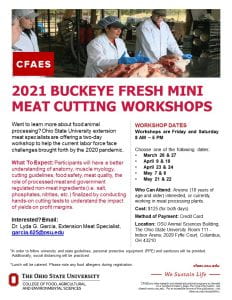
A hands-on opportunity to learn about food animal processing.
When COVID-19 hit the US meat industry in early 2020, many disruptions quickly surfaced impacting our livestock and meat industries. As large-scale meat plants were in the process of slowing their operations, and in some cases even stopping, local meat processors were looked at to relieve the pressures brought forth by COVID-19. As local meat processors stepped up to fill these needs, significant stresses were quickly felt by the employees on the front lines. As many of the small scale meat processors were accustomed to a slower, steadier pace, the onset of doubling or tripling work load caused employees to reconsider their future.
In the world of the meat industry, physical labor is a major component to the job that not many can, or even might choose to do. Smaller meat processors offering a slaughter service are accustomed to harvesting significantly fewer number of animals when compared to large-scale meat processors. For instance, a small-scale meat processor may harvest and process from a few hundred to four thousand beef cattle annually, whereas a large-scale beef plant will harvest over 125,000 head. A small meat processor typically operates with a small group of employees of twenty or less versus hundreds and thousands employed by large scale meat plants.
With the majority of livestock producers relying on small scale meat processors for their custom harvest needs, the labor workforce has been pushed to the limit resulting in many quitting or leaving for better wages. This led meat processors to hire new employees that may have started with minimal to no background in meat cutting. This added challenge can, and will, lead to inefficiencies in meat cutting that impacts profit margins. A significant outcome of the occurrence of a pandemic and its impact on meat processing was the reminder to agriculture of the essential role local meat processors continue to play.
Dr. Lyda G. Garcia, Extension Meat Specialist, is offering two-day workshops relating to meat cutting. Day 1 will consist of classroom learning everything from impacts of animal welfare on meat quality to understanding the impacts of anatomy and muscle myology, to species meat cutting guidelines. Day 2 will consist of hands-on learning of the value of a cutting test (yields) using sides of pork. Although pork carcasses will be used for demonstration purposes, skills obtained from this short course will be applicable to all livestock species as well. Participants will gain a better understanding of the role their skill and workmanship plays on packaging consistent retail cuts, and profit margins.
Workshops are to be held on Fridays and Saturdays from 8:00 a.m. – 5:00 p.m. on the dates listed below.
Workshop Dates:
- March 26 – 27
- April 9 – 10
- April 23 – 24
- May 7 – 8
- May 21 – 22
For more information regarding these workshops, please review the attached flyer. For those interested in participating, please contact Dr. Lyda Garcia at garcia.625@osu.edu.